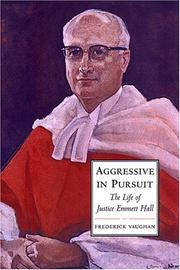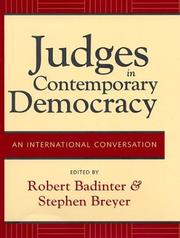| Listing 1 - 4 of 4 |
Sort by
|

ISBN: 128202924X 9786612029240 144267072X 9781442670723 9781282029248 080203957X 9780802039576 Year: 2004 Publisher: Toronto
Abstract | Keywords | Export | Availability | Bookmark
 Loading...
Loading...Choose an application
- Reference Manager
- EndNote
- RefWorks (Direct export to RefWorks)
Few people have had a greater impact on the lives of Canadians than the late Supreme Court judge Justice Emmett Hall. At the forefront of several important judgements in the 1960s and 70s - such as Truscott and Calder - Hall is perhaps best known for his role in the adoption of universal health care at the federal level in 1968. Based on extensive interviews with Hall and people who knew him, Frederick Vaughan's Aggressive in Pursuit tells Hall's remarkable story. Born in Quebec in 1898 and raised in Saskatchewan, Hall had a long and distinguished career as a lawyer. In 1957, former law school classmate Prime Minister John Diefenbaker appointed Hall to the Saskatchewan Court of Queen's Bench, and four years later to the office of Chief Justice of Saskatchewan. In 1963, Diefenbaker elevated Hall to the Supreme Court of Canada, where he took up the task of universal health care and showed himself to be an aggressive defender of native causes. Aggressive in Pursuit traces Hall's career from his earliest days of private practice in Saskatchewan to the end of his career, and death, in 1994. It shows how one prairie lawyer made a difference in the life of Canada.
Judges --- Alcaldes --- Cadis --- Chief justices --- Chief magistrates --- Justices --- Magistrates --- Courts --- Legal status, laws, etc. --- Officials and employees --- Hall, Emmett M., --- Hall, Emmett Matthew, --- Canada. --- Supreme Court of Canada --- Canada (Province) --- Canadae --- Ceanada --- Chanada --- Chanadey --- Dominio del Canadá --- Dominion of Canada --- Jianada --- Kʻaenada --- Kaineḍā --- Kanada --- Ḳanadah --- Kanadaja --- Kanadas --- Ḳanade --- Kanado --- Kanakā --- Province of Canada --- Republica de Canadá --- Yn Chanadey
Book
ISBN: 2802718460 9782802718468 Year: 2004 Volume: 53 Publisher: Bruxelles Bruylant
Abstract | Keywords | Export | Availability | Bookmark
 Loading...
Loading...Choose an application
- Reference Manager
- EndNote
- RefWorks (Direct export to RefWorks)
Law of civil procedure --- European law --- France --- Prejudicial actions --- Judges --- Question préjudicielle --- Juges --- Justice, Administration of --- 347.98 --- Rechterlijke bevoegdheden. Bevoegdheden der rechtscolleges --- 347.98 Rechterlijke bevoegdheden. Bevoegdheden der rechtscolleges --- Question préjudicielle --- Administration of justice --- Law --- Courts --- Alcaldes --- Cadis --- Chief justices --- Chief magistrates --- Justices --- Magistrates --- Law and legislation --- Legal status, laws, etc. --- Officials and employees --- Justice, Administration of - European Union countries - Congresses --- Judges - European Union countries - Congresses

ISBN: 0814789714 0814739342 9780814739341 0814799264 9780814789711 9780814799260 Year: 2004 Publisher: New York, NY
Abstract | Keywords | Export | Availability | Bookmark
 Loading...
Loading...Choose an application
- Reference Manager
- EndNote
- RefWorks (Direct export to RefWorks)
Law, politics, and society in the modern West have been marked by the increasing power of the judge: the development of constitutional justice, the evolution of international judiciaries, and judicial systems that extend even further into social life. Judges make decisions that not only enforce the law, but also codify the values of our times.In the summer of 2000, an esteemed group of judges and legal scholars met in Provence, France, to consider the role of the judge in modern society. They included Robert Badinter, former president of the Constitutional Council in France; Stephen Breyer, Justice of the Supreme Court of the United States; Antonio Cassese, the first president of the International Criminal Tribunal for the former Yugoslavia; Dieter Grimm, former vice president of the Constitutional Court of Germany; Gil Carlos Rodriguez, president of the Court of Justice of the European Union; and Ronald Dworkin, formerly of Oxford University, now professor of philosophy and law at the New York University Law School. What followed was an animated discussion ranging from the influence of the media on the judiciary to the development of an international criminal law to the judge's consideration of the judge's own role. Judges in Contemporary Democracy offers a rare and intimate glimpse into the powers and the role of judges in today's society.
Political questions and judicial power. --- Judicial process. --- Judgments. --- Judges. --- Judicial activism --- Judicial power and political questions --- Act of state --- Administrative discretion --- Judicial review --- Jurisdiction --- Law --- Rule of law --- Separation of powers --- Decision making, Judicial --- Judicial behavior --- Judicial decision making --- Judges --- Procedure (Law) --- Court decisions --- Court rulings --- Civil procedure --- Courts --- Criminal procedure --- Estoppel --- Judicial process --- Stare decisis --- Alcaldes --- Cadis --- Chief justices --- Chief magistrates --- Justices --- Magistrates --- Political aspects --- Psychological aspects --- Interpretation and construction --- Legal status, laws, etc. --- Officials and employees

ISBN: 284586552X Year: 2004 Publisher: Paris Karthala
Abstract | Keywords | Export | Availability | Bookmark
 Loading...
Loading...Choose an application
- Reference Manager
- EndNote
- RefWorks (Direct export to RefWorks)
Disappeared persons --- Human rights workers --- Judges --- Alcaldes --- Cadis --- Chief justices --- Chief magistrates --- Justices --- Magistrates --- Courts --- Activists, Human rights --- Advocates, Human rights --- Defenders of human rights --- Human rights activists --- Human rights advocates --- Human rights defenders --- Workers, Human rights --- Reformers --- Desaparecidos --- Missing persons --- Victims of state-sponsored terrorism --- Legal status, laws, etc. --- Officials and employees --- Cyiza, Augustin. --- Rwanda --- Jamhuri ya Rwanda --- Luwangda --- Republic of Rwanda --- Republika Nyarwanda --- Republika y'u Rwanda --- République du Rwanda --- République rwandaise --- Repubulika y'u Rwanda --- Repubulika y'Urwanda --- Résidence du Ruanda --- Respublika Ruanda --- Ruanda --- Ruʼandah --- Ruwanda --- Rwandese Republic --- Rwandu --- Руанда --- Республика Руанда --- רואנדה --- ルワンダ --- 卢旺达 --- Ruanda-Urundi --- Armed forces --- Officers --- Politics and government --- Internal politics --- Cyiza, Augustin
| Listing 1 - 4 of 4 |
Sort by
|

 Search
Search Feedback
Feedback About UniCat
About UniCat  Help
Help News
News